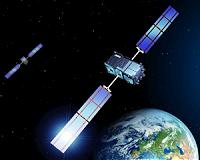 |
Brussels (UPI) May 25, 2011 Backed by Russia, the Europeans will launch two of their Galileo global positioning satellites into space in October, the European Commission said this week. "This launch is of historical importance," European Commission Industry Commissioner Antonio Tajani said in a statement. "Europe is demonstrating that it has the capability to be at the forefront of technological innovation." To be launched Oct. 20 from French Guiana, the two satellites would be the first of eventually up to 30 placed in orbit by 2019. Galileo would then provide around-the-globe navigation for aircraft, ships, cars and private users -- similar to the U.S. Global Positioning System. The satellites will be launched via a Russian Sojus carrier rocket because Europe's Ariane isn't up to the task. Tajani defended Galileo from criticism that the system is too expensive. "Thousands of SMEs and innovators across Europe will be able to spot business opportunities and to create and develop their products based on the future Galileo infrastructure," he said. "Citizens will benefit from its services. Galileo is value for money and I count on member states' cooperation to find a solution for its financing." During the first phase, which ends at the start of 2014, up to 18 satellites are to be put into orbit for around $4.8 billion, already more than the initial estimate, Tajani revealed this week. Costs for the program have constantly risen over the past years and financing beyond the first 18 satellites isn't secured. Tajani urged EU member states to come up with the additional money. The European Commission said Galileo is expected to deliver around $85 billion to the European economy over a period of 20 years. "Galileo will underpin many sectors of the European economy through its services: electricity grids, fleet management companies, financial transactions, shipping industry, rescue operations, peace-keeping missions, all depend heavily on satellite navigation technology," the commission said in a statement. "In addition, Galileo will make Europe independent in a technology that is becoming critical, including for strategic areas such as electricity distribution and telecommunication networks." The U.S. GPS system consists of 30 satellites and is up and running; Russia has 26 Glonass satellites in orbit that back up its system but it lost one during a failed launch in January. Moscow said last year it would put eight Glonass satellites into orbit by the end of 2013 to ensure the worldwide operation of its positioning system.
Share This Article With Planet Earth
Related Links GPS Applications, Technology and Suppliers
 Galileo: Europe prepares for October launch
Galileo: Europe prepares for October launchParis (ESA) May 24, 2011 The European Space Agency, Arianespace and the European Commission has announced that the launch of the first two satellites of Europe's global navigation satellite system is planned to take place on 20 October. This will be the first of a series of Galileo satellite launches by Arianespace from Europe's Spaceport in French Guiana. The announcement follows a detailed review held on 12 May ... read more |
|
| The content herein, unless otherwise known to be public domain, are Copyright 1995-2010 - SpaceDaily. AFP and UPI Wire Stories are copyright Agence France-Presse and United Press International. ESA Portal Reports are copyright European Space Agency. All NASA sourced material is public domain. Additional copyrights may apply in whole or part to other bona fide parties. Advertising does not imply endorsement,agreement or approval of any opinions, statements or information provided by SpaceDaily on any Web page published or hosted by SpaceDaily. Privacy Statement |